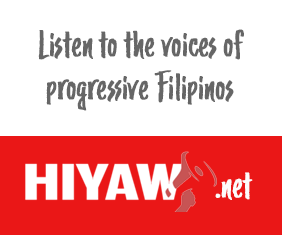A New York-based human rights group on Tuesday criticized President Benigno Aquino III for allegedly not doing enough to provide justice for human rights abuses, eradicate private armies and address the culture of impunity by the police and military organizations.
In its 2011 report, the Human Rights Watch (HRW) said that after seven months into his presidency, Aquino “has taken insufficient steps to make perpetrators of killings and other abuses accountable.”
“President Aquino came to office promising that human rights would be a top priority,” said HRW deputy Asia director Elaine Pearson. “But talk is cheap, so long as security forces remain unaccountable for violent abuses.”
In its World Report 2011, HRW described the Philippines as a multiparty democracy with a thriving civil society and vibrant media, but observed that law enforcement agencies and the justice system remain weak, and the military and police commit human rights violations with impunity.
It also noted that “no significant progress has been made in hundreds of political killings that have occurred over the past decade.”
However, it took exception on the trial of Andal Ampatuan, Jr., a former mayor in Maguindanao province, and several others linked Nov. 23, 2009 massacre of 57 people, including 32 media workers in Ampatuan town, Maguindanao.
The HRW said that since Aquino took office, more than 20 leftist activists have been killed, and that even the international community led by the United Nations, European Union, and the United States, had scored the Philippines’ dismal human rights record.
A local rights group Karapatan claimed that 1,118 extrajudicial killings and more than 200 enforced disappearances were documented in the Philippines between 2001 and October 2009.
“Aquino has not fulfilled his campaign promise to take action against other ruling families who use militias and police as their private armies,” the HRW said.
Task forces were created to examine two private armies elsewhere in the country, but this has not resulted in any further action, the HRW said.
HRW’s Pearson, meanwhile, hailed Aquino’s December order to drop charges against the so-called “Morong 43,” saying it “sends a proper message to the military and police that mistreatment of suspected rebels undermines counterinsurgency efforts.”
In February 2010, the army and police arrested 43 men and women in Morong, Rizal province, and for 36 hours kept them blindfolded and refused them legal counsel. Following Aquino’s order, 35 were released in December.
Three men who face separate criminal charges remain in jail while two men and three women who have admitted to being communist rebels and chosen to enroll in the government’s integration program are still in military custody.
But rather than investigating the allegations of abuse, Pearson lamented that the military granted awards to two officers who led the arrests.
Pearson also cited the two new laws on torture and war crimes that were enacted in late 2009, which will assist prosecutions of government officials implicated in criminal acts.
“New laws on torture and war crimes provide valuable tools for combating abuses. But real progress in professionalizing the army and police will only happen if these laws are put to use,” Pearson said. — LBG/KBK, GMANews.TV



